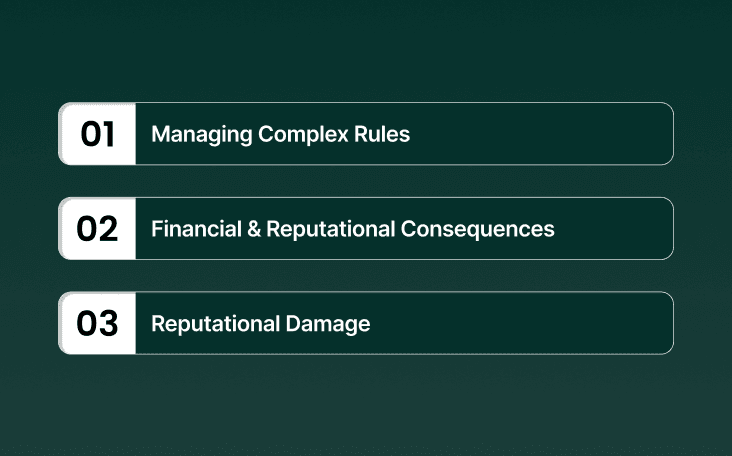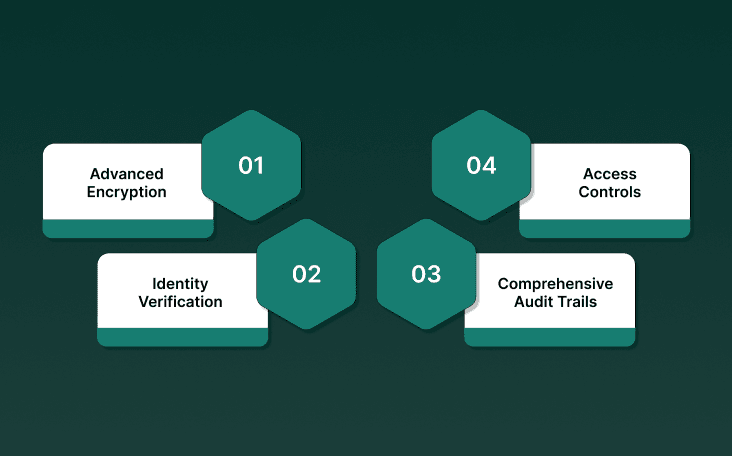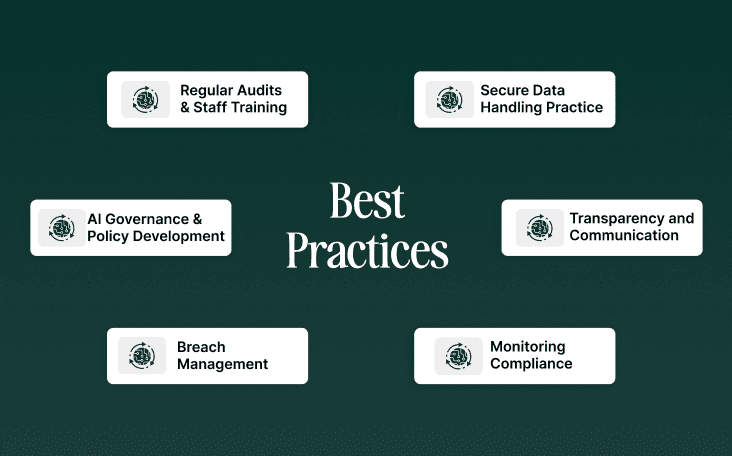Learn how HIPAA-compliant AI voice agents can enhance healthcare by ensuring secure and personalized patient interactions while meeting regulatory standards.

Akshat Mandloi
Updated on
December 26, 2025 at 11:27 AM

In healthcare, patient data security is of utmost importance, and staying compliant with regulations like HIPAA is a constant challenge. With increasing demands for efficiency and better patient care, healthcare organizations are turning to technology to help manage this balance. AI-driven solutions can lead to a significant reduction in operational costs, streamlining processes and improving overall service. However, maintaining compliance with healthcare regulations while adopting new technologies can be complex.
In this blog, we’ll explore the role of HIPAA-compliant AI voice agents in healthcare. We’ll learn how these voice agents work, their benefits, and how they help healthcare organizations improve patient interactions while ensuring data security.
Key Takeaways
HIPAA Compliance Requirements: AI voice agents in healthcare must adhere to HIPAA’s Privacy and Security Rules, ensuring the protection of patient health information (PHI) during interactions.
Core Features of AI Voice Agents: These include encryption protocols (AES-256), multi-factor authentication, role-based access controls, and comprehensive audit trails to ensure data security and compliance with healthcare regulations.
Healthcare Use Cases: AI voice agents automate appointment scheduling, manage prescription refills, assist with insurance pre-authorizations, and provide post-care follow-ups, improving operational efficiency and patient satisfaction.
Maintaining Compliance: Best practices include conducting regular audits, ensuring secure data handling (encryption, de-identification), implementing strong access controls, and providing ongoing staff training to manage PHI.
Future Trends: AI voice agents are set to integrate with telehealth platforms and predictive analytics to enhance patient care and streamline healthcare workflows while maintaining HIPAA compliance.
What is HIPAA Compliance?
The Health Insurance Portability and Accountability Act (HIPAA), signed into law in 1996, plays a critical role in ensuring that healthcare information is protected.
It has two main objectives: ensuring continuous health insurance coverage for workers who lose or change jobs and reducing healthcare costs through standardized electronic transactions.
HIPAA includes several titles, but Title II, known as Administrative Simplification, is the most relevant to data privacy and security. Here’s why HIPAA compliance is so crucial:
HIPAA Privacy Rule: This rule sets national standards for safeguarding personal health information (PHI). It limits the use and disclosure of PHI without patient consent, ensuring privacy is maintained.
HIPAA Security Rule: This rule focuses on protecting electronic protected health information (ePHI), setting standards for ensuring its confidentiality, integrity, and availability across systems.
Now that we understand what HIPAA compliance entails, let's explore the consequences of failing to meet these standards.
The Risks of Non-Compliance: Financial and Reputational Consequences

As voice technology becomes integral to healthcare, the stakes for HIPAA compliance grow higher. With real-time voice interactions, there’s an increased risk of PHI being processed, stored, or transmitted across systems. Here’s why it matters:
Managing Complex Rules: HIPAA-compliant voice agents must adhere to the Privacy Rule, Security Rule, and Breach Notification Rule while maintaining smooth, real-time interactions. Safeguards must protect PHI from initial contact through data processing and storage.
Financial and Reputational Consequences: Failing to meet HIPAA standards can result in heavy penalties:
Fines: Ranging from $100 to $50,000 per violation, with annual penalties reaching up to $1.5 million for repeated offenses.
Criminal Charges: In the most severe cases, violations can lead to criminal prosecution, with fines up to $250,000 and imprisonment for up to 10 years. Source: U.S. Department of Health & Human Services
Reputational Damage: Beyond financial penalties, a HIPAA violation can harm an organization’s reputation. If patient trust is lost, it can significantly affect retention, referrals, and overall market position.
HIPAA compliance is a vital aspect of maintaining trust and safeguarding sensitive patient data in today’s healthcare environment.
Smallest.ai offers HIPAA-compliant AI voice agents that can help mitigate these risks. Integrating real-time voice solutions with strong encryption, access controls, and audit trails ensures compliance while enhancing patient interactions.
So, how do AI agents help maintain HIPAA compliance? Let’s break down the key ways these technologies support secure and efficient healthcare operations.
How AI Agents Can Assist While Maintaining HIPAA Compliance
HIPAA-compliant AI voice agents not only help meet regulatory requirements but also streamline workflows across both patient engagement and backend operations. Here’s how these agents provide value while safeguarding PHI:
Patient-Facing Benefits
Answering FAQs Consistently
AI agents can handle high-frequency queries such as “What are your hours?” or “How do I refill my prescription?”, reducing hold times and keeping call center staff free for urgent inquiries.Appointment Scheduling & Reminders
Agents can manage scheduling, confirmations, and rescheduling, automatically verifying identities and updating records while remaining fully compliant.Post-Care Follow-Ups
Voice agents can automate general aftercare instructions, appointment feedback, or medication adherence reminders — all using pre-approved, compliant messaging.
Administrative & Operational Efficiencies
Prescription Refill Handling
Agents can verify patient identity and securely pass refill requests to pharmacy staff or clinical systems, saving time while maintaining traceability.Insurance Pre-Authorization Assistance
Agents can guide patients through insurance-related data collection, gathering eligibility details for procedures or medication coverage.Primary Triage & Routing
In non-emergency cases, AI can collect symptom data and route patients to the correct department or specialist — improving response speed and reducing front desk burden.
These use cases show how AI voice agents can deliver both compliance and scale, giving healthcare organizations a way to improve efficiency without sacrificing patient trust or data security.
Also Read: AI Assistants for Business: How They Work, Use Cases, and Top Platforms
Now that we’ve seen how AI agents help, let's learn the core features that make healthcare communication platforms HIPAA-compliant.
Key Components of HIPAA-Compliant Healthcare Communication Platforms

When it comes to protecting patient information, healthcare communication platforms must go beyond basic security measures. Here are the key components that ensure HIPAA compliance in voice-enabled systems:
1. Advanced Encryption and Data Protection
HIPAA-compliant voice agents implement robust encryption protocols like AES-256 for data at rest and TLS 1.3 for data in transit. This ensures that all voice communications, transcriptions, and metadata remain secure.
2. Identity Verification and Authentication
To ensure HIPAA compliance, modern voice agents use multi-factor authentication (MFA), combining voice biometrics and integration with patient portals. This ensures that only authorized users can access sensitive information while guiding patients smoothly through verification steps using natural language processing.
3. Comprehensive Audit Trails and Logging
These platforms create tamper-proof audit trails for every interaction involving Protected Health Information (PHI). Logs include timestamps, user IDs, and actions taken, ensuring compliance and aiding audits. Detailed analytics highlight areas for improvement in voice agent performance.
4. Access Controls
To restrict access to sensitive data, platforms implement role-based permissions and multi-factor authentication. These access controls ensure that only authorized personnel can interact with PHI, maintaining confidentiality.
By incorporating these components, healthcare organizations can ensure that their communication systems are secure and compliant with HIPAA regulations.
Also Read: Top AI voice agents for BFSI (Banking, Financial Services, and Insurance) in 2025?
Finally, let’s wrap up by reviewing the best practices to ensure your AI systems stay compliant and secure while delivering high-quality healthcare services.
Best Practices for Maintaining HIPAA Compliance in Healthcare AI

Ensuring HIPAA compliance while using AI technologies in healthcare requires careful attention to privacy, security, and ongoing monitoring. Here are the key practices to help healthcare organizations stay compliant:
1. Regular Audits and Staff Training
Regular Audits: Conduct periodic audits to track data handling practices, identify vulnerabilities, and ensure compliance with HIPAA.
Comprehensive Staff Training: Provide ongoing training for all staff and partners, focusing on HIPAA regulations, data privacy, and the specific responsibilities in managing PHI. Regular updates should also cover new challenges related to AI-driven tools.
2. Secure Data Handling Practices
Data De-identification: Use de-identified data to train AI models wherever possible, reducing the risk of exposing PHI.
Encryption and Access Controls: Implement robust encryption for data in transit and at rest, alongside multi-factor authentication to restrict unauthorized access.
Smallest.ai’s HIPAA-compliant voice agents ensure secure, encrypted patient interactions, while providing the scalability needed to maintain compliance at every level of healthcare operations. Book a demo to learn how our solutions can help streamline your compliance process.
3. AI Governance and Policy Development
AI Governance Team: Set up a team to oversee AI usage and ensure alignment with HIPAA regulations.
Updated Policies: Regularly review and update policies related to AI and PHI to stay in line with evolving regulations.
4. Transparency and Communication
Transparency with Patients: Inform patients about AI usage and data handling practices, incorporating this information in privacy notices.
Collaboration with Partners: Ensure that all third-party vendors comply with HIPAA standards through Business Associate Agreements (BAAs).
5. Incident Response and Breach Management
Clear Incident Response: Implement an effective response plan for data breaches, ensuring incidents are reported within the required timeframe (typically 30-60 days).
Continuous Monitoring: Use AI tools to continuously monitor interactions involving PHI, automatically flagging potential compliance risks for review.
6. Monitoring Compliance and Providing Feedback
Real-Time Monitoring: Continuously monitor patient interactions to identify compliance issues as they arise.
Timely Feedback for Agents: Enable real-time feedback to agents on their interactions, helping them improve compliance and service quality immediately.
By following these best practices, healthcare organizations can effectively maintain HIPAA compliance while using AI technologies to improve patient care and operational efficiency.
Conclusion
Maintaining HIPAA compliance while implementing AI voice agents in healthcare is essential for ensuring patient privacy and security. Adopting best practices like regular audits, secure data handling, and continuous staff training, can help healthcare organizations effectively manage compliance. AI-driven voice agents improve patient interactions and streamline processes and provide 24/7 support, all while adhering to HIPAA standards.
Smallest.ai offers HIPAA-compliant solutions that can help your healthcare organization thrive:
HIPAA-compliant AI voice agents that ensure secure and confidential patient interactions
Real-time monitoring and performance analytics to ensure continuous compliance and track agent performance
Customizable voice solutions that can be tailored to your specific healthcare needs, from appointment scheduling to patient inquiries
End-to-end encryption and multi-layered access controls to protect sensitive data at every stage
Seamless integration with existing systems using developer-friendly SDKs and APIs
Ready to enhance patient care while staying compliant? Book a demo to explore how our HIPAA-compliant AI voice agents can transform your healthcare operations.
FAQs
1. What exactly are HIPAA-compliant AI voice agents in healthcare?
HIPAA-compliant AI voice agents are intelligent systems that handle patient interactions securely while meeting strict healthcare regulations. They help with tasks like appointment scheduling, patient inquiries, and prescription refills.
2. How do AI voice agents maintain HIPAA compliance?
These agents follow HIPAA standards by encrypting data, verifying identities, and generating detailed audit trails. They also use multi-factor authentication to ensure that only authorized users access sensitive information.
3. Can AI voice agents replace human staff in healthcare?
While AI voice agents can handle routine tasks like answering questions and scheduling appointments, they can’t replace human empathy or the need for complex problem-solving. They’re designed to work alongside human staff, improving efficiency while maintaining quality care.
4. What types of tasks can HIPAA-compliant AI voice agents handle in healthcare?
AI voice agents can handle a variety of tasks, including appointment scheduling, prescription management, patient inquiries, insurance pre-authorizations, and follow-up care reminders, all while ensuring HIPAA compliance.
5. How do AI voice agents integrate with existing healthcare systems?
AI voice agents can easily integrate with existing healthcare systems like Electronic Health Records (EHR) and Patient Management Systems (PMS). They use developer-friendly APIs and SDKs to streamline the process without disrupting current workflows.
6. What are the key security features of HIPAA-compliant AI voice agents?
Key security features include advanced encryption protocols, identity verification, multi-layered access controls, and comprehensive audit trails to ensure patient data is protected from unauthorized access and breaches.

Automate your Contact Centers with Us
Experience fast latency, strong security, and unlimited speech generation.
Automate Now


